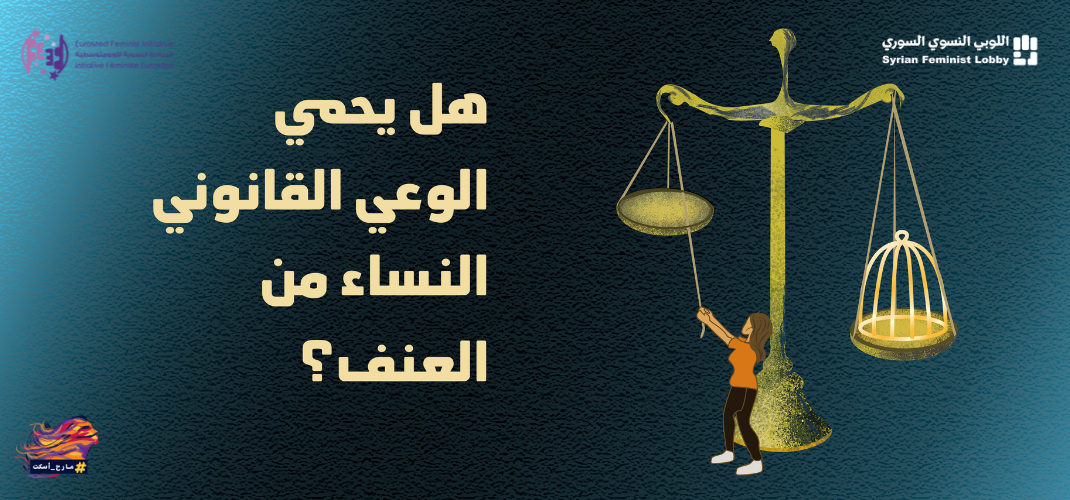Alaa Mohammed – Syrian journalist and member of the Syrian Feminist Lobby.
One of the most prominent challenges women in our Eastern societies face is the significant gap between the rights stipulated in the law, which are often limited, and their ability to obtain or demand these rights. This is a result of the contradictions present in the national constitutions of Arab countries, which generally advocate for equality, but the actual implementation of laws is based on discrimination.
Most laws in Syria and other Arab countries are based on custom and religion, consequently making women victims of a prevailing culture of discrimination and discriminatory religious texts that have positioned them in a lower status than men. This has allowed the practice of violence against them with social approval and religious decrees.
Customs and society’s culture reinforce violence against women:
In patriarchal societies, women’s humanity is not acknowledged. I don’t believe this perspective stems solely from the biological factor, the “usual argument,” but rather from the dominant male culture that has consistently confined, marginalized, and excluded women.
Perhaps all Syrian women have experienced some form of violence in their lives solely because of their gender. Among them are those deprived of education because prevailing culture dictates that “a girl’s destiny is her husband’s home,” prompting families to prioritize educating their brothers.
Among them are those forced into child marriage because tradition and religion allow their “guardian” to control their life and choices. Thus, she finds herself a wife, a servant, and a mother, and there are also countless stories of women enduring continuous abuse from their husbands because their families refuse them the status of divorcee.
A schoolteacher, Rima married her university colleague and gave birth to three children with him. After she got employed, her husband took control of her salary and would give her a small amount that barely covered her personal needs. He justified this by claiming that he was better at managing the money and that her salary was rightfully his since she was his “property.” Therefore, he argued that her time working was taking away from his rights, and she owed him compensation.
While writing this article, I received a message from my friend on WhatsApp containing a screenshot of a post that said, “A Syrian woman has died due to injuries sustained from brutal beating by her husband.” When I opened the page where the news was published and delved into the comments, I found that the majority revolved around these sentiments: “God knows what she did. She deserved it. If he slapped her a couple of times, it’s not a big deal. Her time is up.”
To eradicate violence, it is crucial to work on shaping the upcoming generations culturally. This can be achieved by raising them with a foundation of freedoms, rights, citizenship, and equality while instilling human values and promoting a culture of non-violence.
Do women trust the laws?
As a Syrian woman who primarily communicates with other Syrian women and discusses our issues, whether inside Syria or abroad, I can say that we do not trust the existing laws in Syria. They are inherently built on discrimination and biased towards men. Some of us are sometimes concerned about applying civil laws in Turkey and Europe.
Lana, a Syrian woman living in Turkey who is currently trying to obtain a divorce from her husband, who has repeatedly physically abused her and attempted to strangle her, told me that she hesitated to involve the police and the courts because she feared a lack of response. She believed that the laws in Turkey resembled those of her country, and she only carried negative memories of how government institutions treated women.
An example is the Syrian Personal Status Law, which discriminates against women and violates citizenship rights and human rights, including the right to life, respect, justice, freedom, women’s right to work, privacy, and a dignified life. Additionally, the laws governing personal status are separately amended for each religious sect, generating real-life disparities not based on the capabilities and development of different social groups but on affiliation with a specific religious denomination.
The fear that Lana and other women experience stems from their limited knowledge of the laws in the countries they sought refuge in. Sometimes, they are deceived by their surroundings, intimidated, and threatened, being told that the rules here are similar to those in Syria and that they would be the only losers if they turned to the police or the courts after experiencing violence.
Here, women’s advocacy institutions are responsible for informing women about their legal rights in various countries, especially those related to protecting them from violence. Women are also responsible for researching and becoming familiar with new countries and their laws to have the necessary tools to defend themselves.
Awareness about these rights is critical because it motivates one to reject harm and violence and to take a firm stance with a strong desire to defend oneself.




